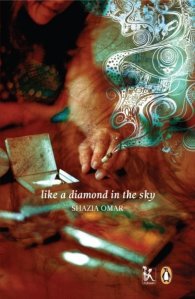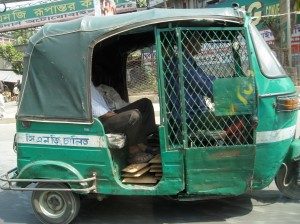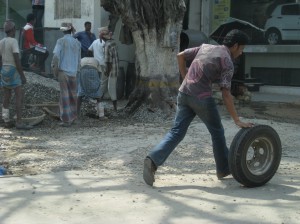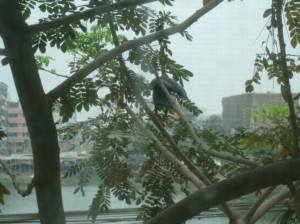So I just came back from Kolkata today (Calcutta, to the colonially-inclined racists out there). It was my first time in India in like 25 years or something. Which is kinda weird considering I’m brown… but I was always bored by India — more into asian chicks. Ha ha — just kidding — brown chick renaissance goin’ on right here. Besides, I thought, what could be so damn different between Bangladesh and India? Between East Bengal and West? Between Kolkata and Dhaka? Both hot, stinky hellholes epitomizing human suffering, right? Typhoid, dysentery, malaria (do we got malaria?).
Boy was I wrong. Sure they’re both hot. They’re both stinky. Both cities share similar linguistic roots, and many of the men in both places sport thick virility-tickling mustaches. But that’s about where the similarities end.
Whether it’s the Airtel/Aircel ads that bring to mind Indian cricket team captain MS Dhoni telling me to press my internet button, or the fresh and mountainy TATA Himalayan spring water bringing the slight taste of diesel fuel to my mind’s tongue, India (or INDIA!, as it prefers to be known) has seeped into West Bengali culture like arsenic into UNICEF tubewell water in Bangladesh.
Today, Hindi and English are two of the more prevalent languages spoken in Kolkata, a city that used to pride itself on having the “purest” language in all of South Asia (Bengali – as per its similarities to Sanskrit, the now-dead root of most South Asian languages). And no one seems to care about the cultural dilution. Coz everyone’s making bank (except those poor muslims living in those huts on the way to Kolkata airport sorting through filth). Immigrants, whether it be Biharis, Tibetans, or Punjabis, are taking all the shitty jobs that those intellectualized Bengalis think themselves too good for, like street vending, bell-boying and cab driving. Bengalis work 9-5, getting fat on ghee and counting money, as they have for hundreds of years. Except now they do it in multinational banks. And everybody’s happy (cept the muslims of course, but who cares about them).
But only upon walking the streets of this modern, cosmopolitan Kolkata( they have sidewalks and little shops, and people actually walk and talk, unlike in Dhaka), and checking out the cute girls of all races, shapes and sizes (I like the Orissans! Nah jk, I’m equal opportunity fucker) walking on the streets with no male guardian or protective SUV shell, did I get a sense of how great the divide really is between us Bangladeshis and our snooty neighbors who don’t wear deodorant.
On my first day, I got into a discussion with one of my travel companions about how he believed India is actually falling apart from the inside, coz they are all so culturally dissimilar, and how there’s an Maoist uprising in every state now, and how us Bangladeshis are actually lucky coz we’re a cohesive homogenous unit who all think a certain way, and we really don’t treat our minorities as badly. Ummmm… bullshit. My whole life I’ve seen what culturally dissimilar democracies bring to the global table. New York City, London, and Spain, to name a few. Probably the three pinnacles of human civilization in terms of open-mindedness, acceptance of different cultures, and kick-ass art and music. Immigration, emigration — the movement of people to new locations where they are isolated from those who think just like them — fosters social, cultural, and economic development. Sure, it may be a rocky road, but its one that ends in nougaty nutty goodness.
That to me, is the inherent problem that we face as Bangladeshis. There are a shitload of us — 140 million — but most of us worship the same god, speak the same language, eat the same food, and even wipe our asses the same way (although that last part’s changing, hopefully). We drink the same tea, spit on the same corners, squat to piss, like the same bad Chinese food and music that makes us weepy. How can 140 million be wrong? Well even if they aren’t wrong they sure are damn boring.

Shazia's book cover... I tried to snort it several times.
The above individual also had a few words of wisdom to ad (nah he’s pretty smart and he’s gonna be reading this blog soon, so I gotta ease up on him). “A friend of mine once said Dhaka has all of the bad things about a big city with none of the good.” We have the insane traffic, we have the pollution, we’ve got the crime, and we’ve got the drug problem. But where is the cultural gemification? Where are the centers for cutting edge music and art? The great street food and the open minded people?
They’re in India, right across the border. Tickets start at about $90 bucks round trip on Kingfisher Airlines, and the stewardesses are hot (with their little red miniskirts)!
Now in case anyone thinks I’m hating on my country, no way. Bengalis have a lot of great democratic, open-minded qualities upon which this country was formed (they escape me right now, its been a while). I just don’t want us to forget those on the road to globalization. I’m just another self-loathing liberal who “wants us to be as good as I know we can.”
Lastly, I’d also like to give a shout out to mah gurl Shazia, who just published her first book with Penguin India, and who’s book launch was the reason I flew out to Kolkata. “Like a Diamond in the Sky.” Its about drugs and Bangladesh so you know its good or at least ironically sad. Read it. She’s gots talents, yo.
Filed under: Politics, traveling, asia, bangladesh, bengali, globalization, hindi, immigration, india, religion, traveling




Recent Comments